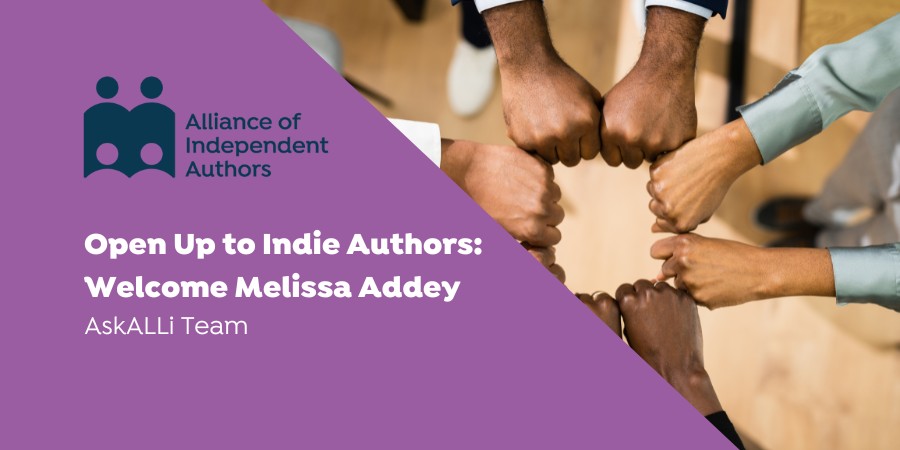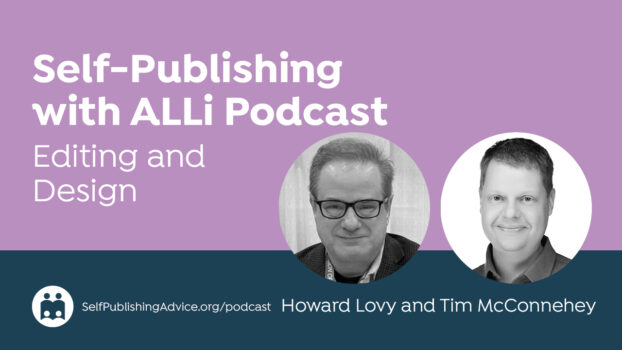For ten years, the Alliance of Independent Authors has worked to improve representation for indie authors. One aspect of that work has been getting organizations, awards and services to open their doors to self-publishers. We're delighted to have recently appointed a dedicated manager, Melissa Addey, for this important work and to have updated our Open Up To Indie Authors campaign and “Open Up” guidebook series. This is our Open Up To Indie Authors Campaign update.
The aim of the Open Up to Indie Authors campaign is to ensure that self-published authors are welcome, indeed celebrated, throughout the writing, literary, and publishing worlds – in bookshops, awards, associations and when applying for grants, commissions and fellowships. In short, wherever writers meet readers, influencers or curators.
A core component of that campaign is our range of guides directed at industry players and a revised guide for authors that gives self-publishers the confidence and knowledge to successfully approach these outlets. From bookshops to festivals, reviewers to awards, there are many exciting opportunities to explore.
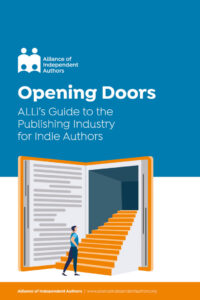
ALLi members receive free digital copies of all our books. Members can download Opening Doors: ALLi’s Guide to the Publishing Industry for Indie Authors ebook for free.
Log into your ALLi account and navigate to CAMPAIGNS > ONGOING CAMPAIGNS > OPENING UP TO INDIE AUTHORS CAMPAIGN .
Non-member can purchase copies from our store here.
Read on for an extract from the introduction to the author guide in which ALLi director Orna Ross outlines the thinking behind the Open Up campaign.
Opening Doors: An Introduction

Orna Ross, Director of ALLi
No matter how a book is published, every author seeks readers, and there are many ways of reaching them, online and off:
- retailers
- reviewers
- libraries
- festivals
- awards
- professional associations
- word of mouth recommendations
- grants and funding
It seems reasonable that books of equal quality should receive equal treatment in all these spheres, no matter how they're published. So it's frustrating and disappointing when self-published authors who have produced top-quality books meet glass ceilings, closed doors or dead ends, simply because they've gained the skills to manage their own book production and promotion.
The publishing trade and literary establishment needs to recognize and respect the high quality of books now being self-published and the undeniable achievements of independent authors.
It’s one thing for a book to be rejected by a literary organization because it is not good enough, with a shoddy cover or content. To have it rejected because it lacks a publishing imprint’s name on its spine, even though it’s a match for a trade published books in every other respect, feels uncomfortably like snobbery or literary prejudice—especially when it’s a blanket ban.
The fault is not all on the side of a gatekeeping establishment. Among certain self-published authors there's an assumption that simply publishing a book gives them de facto equal rights in the marketplace, an assumption that's not realistic for those who have produced a poor quality book.
Savvy indie authors understand they are operating within an industry which has its own needs. They know publishing is a skill developed over time and, as publishers, we need to learn how the book trade and its associated operations work. They are realistic and accept that when approaching the publishing trade or literary influencers like librarians, festivals or reviewers, indie authors can do much to help our own cause.
We are unlikely to have the length and breadth of experience enjoyed by traditional publishing companies, some of which are hundreds of years old and have dealt with hundreds of authors. For example, if we are familiar with retailers’ standard expectations for trade discounts but are unwilling to meet them, we should not feel hard done by if our local bookshop refuses to stock our books.
With realistic expectations, we’ll meet less disappointment.
But we also need to remain open-minded about our prospects and not assume prejudice before we meet it. It may not happen. Lots of prize awards that are open to indie authors, for example, report disappointment at not getting more self-published entries.
Equally, those that haven't yet admitted indie authors into their programs needs to find a way to do so. Simply shutting the doors isn't good enough.
Open Up to Indie Authors Campaign: New Campaign Manager
“It makes no sense to judge books on the process that creates them,” says Melissa Addey, ALLi's new Campaigns Manager. “Otherwise one could claim that any book not handwritten by monks on vellum is not a ‘proper’ book. Times and the mode of production of books change and the industry needs to move with those changes.”

Melissa Addey, Organization Member Manager
Melissa has been self-publishing full time since 2015, mainly in historical fiction. She also has a PhD in creative writing, 15 years experience in developing new products and mentoring entrepreneurs for government innovation programmes and is a past Leverhulme Trust Writer in Residence at the British Library, where she now runs workshops for authors on entrepreneurial skills.
Her connection with ALLi originated with the Open Up To Indie Authors campaign. “I originally got involved because I cc’d ALLi into a series of letters I wrote to various organizations that were, I felt, unfairly closed to self-published authors. There were exciting opportunities I was being barred from purely because of my chosen publishing route, and that annoyed me. I felt I could show a track record as a professional, experienced author and they were ignoring everything I’d done and achieved, just because of how my books got produced.
“Eventually Orna asked whether I’d like to come and write even more of those letters but with ALLi’s backing. And I was delighted to do just that.”
The role has grown from there and we've been updating our materials and website, ready to reach out to organizations and other. Our revised campaign page explains what's going on – do pop over and take a look!
We've been updating our author Open Up guidebook (see below) and creating a set of brief guides for bookshops, writing organizations, reviewers and more, explaining how they can better welcome and support indie authors.
For example, although many prizes now accept self-published authors, their prizes may be very focused on aspiring traditional authors, perhaps offering a first prize of meeting with a literary agent or a publisher.
By making small tweaks, they can better serve indie authors as well: perhaps, in our example, offering a prize of meeting with an editor or book marketing expert.
We're also speaking with major festivals around the world to try and highlight self-publishing authors on their programmes in the future.
And we've been developing our latest membership category for non-profit writing associations around the world: ALLi's Organization Membership. ALLi has now created a new tier of membership specifically for writing and publishing organizations, to help them make sense of the self-publishing world and support their own members who are interested in this path. Melissa will also be overseeing this new tier of membership.
This allows us to share a decade of self-publishing expertise with a wider range of authors who belong to other writing organisations focused on genre or location, but who would also benefit from high quality, up to date self-publishing knowledge.
For organizations, we have created a set of brief, practical booklets to update their understanding of self-publishing today, encourage them to welcome indies and offer proactive steps to help them meet the needs of this author group. We will send these to organizations with an interest in opening up to indies and seeing how we can support them.
Some organizations still remain closed to indies. We will contact them to understand why and how we can help to change their minds.
You can read more about our organization membership here. If you’d like us to contact an organization a particular , email Melissa: [email protected].
What can authors do to help the Open Up to Indie Authors campaign?
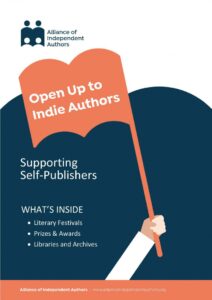 As an author, there are lots of ways you can help and be involved, both to benefit yourself and other Indies. First, get your copy of Opening Doors, our revamped best practice guide to the publishing industry for indie authors.
As an author, there are lots of ways you can help and be involved, both to benefit yourself and other Indies. First, get your copy of Opening Doors, our revamped best practice guide to the publishing industry for indie authors.
Download it here.
This book is full of tips, insights and inspiring case studies to help you make your way as an author, from entering awards and joining literary associations, to approaching festivals, bookshops and making the most of your publication rights. We want you to know how the publishing industry works – both its opportunities and its restrictions, so that you can target your approaches for the best possible chance of success.
The book includes our new ‘author checklist’, a quick reminder of how to present your book and yourself as an author in the most professional way. This will not be news to more established authors, but many writers can feel they have been rejected because they are self-published when actually there was something else at play: perhaps a poor cover or a lack of understanding of how book retailers operate. We want to give you every chance to succeed and this book is a guide to many important opportunities.
We also have a template letter (along with a page of great self-publishing facts and figures) that you can download and use if an organization you’re interested in won’t let you in. Write to them directly and drop me a line so I can join the conversation. Or if you’d rather the letter came from me, again, let me know and I’ll be happy to oblige.
We have an Opening Up To Indie Authors campaign mailing list. If you have the time, we’d love you to get involved. Occasionally we need members’ help, perhaps by sending emails to ask an organization to include Indies or identifying which areas you'd like us to target next. We won't ask for anything onerous and we’ll supply templates if at all possible, but there is power in numbers. You can join on this page too.
Of course, if you're not the campaigning type, you don't have to join. Just by doing your work, you're helping the publishing world to open up. Says Orna Ross: “At this point in the development of the self-publishing sector, every indie author is an ambassador.
“Every marketing and promotional activity you undertake with literary and publishing influencers not only helps sell your books, but also helps persuade the reading public—and the publishing establishment—of the quality and value of self-published work.
“So go for it! Engage with your local media, reach out to book groups, connect with your neighborhood libraries, bookstores and festivals. Seek new and creative methods of writing, publishing, and promotion. And share your achievements wherever you can, online and off.”
“New issues and opportunities affecting authors emerge all the time and ALLi is taking proactive steps to help authors address them. ALLi campaigns allow us to act as a co-ordinated voice for authors everywhere: not just our own members but all self-published authors, and ultimately all authors, whatever their route to publication, benefit from that. ”
What’s Coming Next? Melissa Outlines Upcoming Campaigns
“Self-publishing for All: how do we make our self-publishing expertise more accessible? Both here at ALLi and further afield, we want everyone to be able to access self-publishing. That will mean working out where the barriers are and removing them in whatever creative ways we can find. We’ll be returning to this in future issues. In the meantime, I’d love to hear any thoughts you already have on this: [email protected]
“Self-publishing 3.0: this ALLi campaign is already well established, but it’s close to my heart. We need to raise authors’ incomes through creative business practices. I dislike the repeated mythology of ‘starving artists in garrets’, as though you shouldn’t be paid properly just because you enjoy your job.
“I loved my previous jobs at Sainsbury’s and at the consultancy, but still got paid a proper salary. I think a lot of the publishing industry and the art world rather likes that myth, and acts accordingly, and I think it needs a wake-up call.
“An author doesn’t have to aim at being a millionaire, but they should stand a decent chance of making a regular income. It’s always tempting to think ‘I only write books, it’s not important like other jobs’, but during the pandemic, I had so many readers thank me for giving them a bit of escapism and comfort at a very stressful time.
“This is something I’ve heard from many authors over the years – that what we do matters. We know from being readers ourselves how much books matter, in many ways – from comforting to educating, from opening our eyes to other lives to helping us understand ourselves. And we should be fairly compensated for our work.
“As you can see, I’ve got my hands pretty full for quite some time. What is it they say about asking a busy person? I’ll try and live up to that.”
Already Opened Up
“And to finish on a super-positive note, because I want to share lots of success stories: did you know that all of the awards below now accept self-published authors? Clearly self-publishing is good enough for the Pulitzer!”
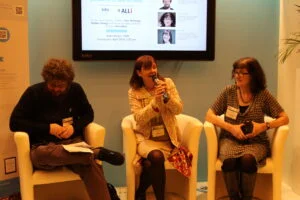
Orna Ross launching the original “Opening Up To Indie Authors” campaign at the London Book Fair 2014, with Dan Holloway and Debbie Young
- The Arnold Bennett Prize
- The Arthur C Clarke Award
- The Bord Gáis Energy Irish Book Awards
- The British Book Awards
- The Commonwealth Book Prize
- The Rathbones Folio Prize
- The Jhalak Prize
- The Kitschies
- The Lambda Literary Award
- The Lindisfarne Prize for Crime Fiction
- The Peters Fraser + Dunlop Young Writer of the Year
- The Pulitzer
- The Nebula Award
- The Romantic Novelists' Association Awards (the RoNAs)
“Do check them out and start entering. Every indie win is a win for us all.”

